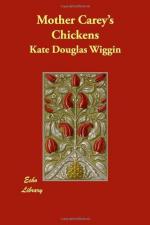Not a word has been said thus far about the Yellow House barn, the barn that the “fool Hamilton boys” (according to Bill Harmon’s theories) had converted from a place of practical usefulness and possible gain, into something that would “make a cat laugh”; but it really needs a chapter to itself. You remember that Dr. Holmes says of certain majestic and dignified trees that they ought to have a Christian name, like other folks? The barn, in the same way, deserves more distinction than a paragraph, but at this moment it was being used as a storeroom and was merely awaiting its splendid destiny, quite unconscious of the future. The Hamilton boys were no doubt as extravagant and thriftless as they were insane, but the Careys sympathized with their extravagance and thriftlessness and insanity so heartily, in this particular, that they could hardly conceal their real feelings from Bill Harmon. Nothing could so have accorded with their secret desires as the “fool changes” made by the “crazy Hamilton boys”; light-hearted, irresponsible, and frivolous changes that could never have been compassed by the Careys’ slender income. They had no money to purchase horse or cow or pig, and no man in the family to take care of them if purchased; so the removal of stalls and all the necessary appurtenances for the care of cattle was no source of grief or loss to them. A good floor had been laid over the old one and stained to a dark color; the ceiling, with its heavy hand-hewn beams, was almost as fine as some old oak counterpart in an English hall. Not a new board met the eye;—old weathered lumber everywhere, even to the quaint settle-shaped benches that lined the room. There was a place like an old-fashioned “tie-up” for musicians to play for a country dance, or for tableaux and charades; in fine, there would be, with the addition of Carey ideas here and there, provision for frolics and diversions of any sort. You no sooner opened the door and peeped in, though few of the Beulah villagers had ever been invited to do so by the gay young Hamiltons, than your tongue spontaneously exclaimed: “What a place for good times!”
“I shall ‘come out’ here,” Nancy announced, as the three girls stood in the centre of the floor, surrounded by bedsteads, tables, bureaus, and stoves. “Julia, you can ‘debut’ where you like, but I shall ‘come out’ here next summer!”
“You’ll be only seventeen; you can’t come out!” objected Julia conventionally.
“Not in a drawing room, perhaps, but perfectly well in a barn. Even you and Kitty, youthful as you will still be, can attend my coming out party, in a barn!”
“It doesn’t seem proper to think of giving entertainments when everybody knows our circumstances,—how poor we are!” Julia said rebukingly.
“We are talking of next summer, my child! Who can say how rich we shall be next summer? A party could be given in this barn with mother to play the piano and Mr. Popham the fiddle. The refreshments would be incredibly weak lemonade, and I think we might ‘solicit’ the cake, as they do for church sociables!”




